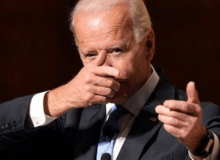A federal judge in Colorado has falsely proclaimed that despite the Second Amendment, Americans have no right to purchase a gun.
This left-wing activist posing as a judge could not be more wrong.
Senior Judge John L. Kane of the U.S. District Court of the District of Colorado recently released his very absurd claim on November 13 in a decision denying the Rocky Mountain Gun Owners and Alicia Garcia a preliminary injunction which challenges Colorado’s newly-enacted three-day waiting period on all gun sales.
Here is his relevant section:
Plaintiffs contend that the words “keep” and “bear” in the Second Amendment are implicated by the waiting period required by the Act. In Heller, the Supreme Court examined the “normal meaning” of those words at the time of the Nation’s founding, reviewing definitions from contemporaneous dictionaries. As the Court explained, the 1773 edition of Samuel Johnson’s Dictionary of the English Language “defined ‘keep’ as, most relevantly, ‘[t]o retain; not to lose,’ and ‘[t]o have in custody.’” . The Court then turned to the word “bear” and determined that it means to “carry.” The Court clarified that, when “bear” is “used with ‘arms,’ however, the term has a meaning that refers to carrying for a particular purpose—confrontation.” So, putting all the pieces together, the Court found that the text of the Second Amendment “guarantee[s] the individual right to possess and carry weapons in case of confrontation.”
From this reading of the plain text, it is clear the relevant conduct impacted by the waiting period—the receipt of a paid-for firearm without delay—is not covered. Still, Plaintiffs attempt to equate the words “obtain” and “possess.” But these terms are not equivalent. To “keep,” under the definitions provided in Heller, meant to retain an object one already possessed. It did not mean to receive a newly paid-for item, and it certainly did not mean to receive that item without delay. Likewise, “hav[ing] weapons” indicates the weapons are already in one’s possession, not that one is receiving them.
But here is the problem with his lack of logic.
One cannot exercise the right to possess a firearm unless one also has the right to obtain one!
In fact — and apparently he never bothered to look — there is already rhetoric covering this very topic.
Back in 2016, a ruling by the U.S. Court of Appeals for the Ninth Circuit maintained that Americans have a Constitutional right to acquire and sell arms.
The Ninth Circuit Court remanded the case of Teixeira v. County of Alameda back to a lower court informing it the court that the Second Amendment and its history protects the rights of Americans to self-defense including the “right to acquire weapons” as well as own them.
This puts a dent in the city of Alameda’s regulations that practically bans the opening of any gun store in the city.
As 9th Circuit Judge Diarmuid O’Scannlain explained, “The historical record indicates that Americans continued to believe that such right included the freedom to purchase and to sell weapons. In 1793, Thomas Jefferson noted that ‘[o]ur citizens have always been free to make, vend, and export arms. It is the constant occupation and livelihood of some of them.’”
As to the possibility that a municipality could make rules for gun shops so strict that gun shops are essentially outlawed (or does, indeed, outlaw them outright), the court ruled that the access to guns is covered by the Second Amendment.
If “the right of the people to keep and bear arms” is to have any force, the people must have a right to acquire the very firearms they are entitled to keep and to bear. Indeed, where a right depends on subsidiary activity, it would make little sense if the right did not extend, at least partly, to such activity as well. The Supreme Court recognized this principle in very different contexts [citing cases involving the right to use contraceptives and the First Amendment].
If you want to go back to the founders, Thomas Jefferson also broached this topic.
In 1792, Jefferson noted that you can’t have a right to a thing unless you are able to have access to the tools and other items in connection with that thing.
In his Report on Navigation of the Mississippi (1792, ME 3:180), Jefferson wrote, “It is a principle that the right to a thing gives a right to the means without which it could not be used, that is to say, that the means follow their end.”
In other words, if Americans have no access to a gun store and cannot buy guns then their right to bear arms is necessarily — and illegally — eliminated.
Follow Warner Todd Huston on Facebook at: facebook.com/Warner.Todd.Huston, or Truth Social @WarnerToddHuston
Tags: Commentary




















Join the conversation!
We have no tolerance for comments containing violence, racism, vulgarity, profanity, all caps, or discourteous behavior. Thank you for partnering with us to maintain a courteous and useful public environment where we can engage in reasonable discourse.